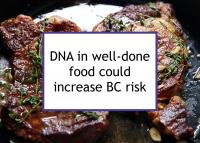Consumption of well-done meat and fish has been found to be associated with increased risk of breast cancer and reduced survival. The association is strongest for red meat (including such common dishes as hamburgers, bacon, pork chops, ribs and other fried or barbecued pork or beef), but is also evident for chicken and fish.
The heightened risk of breast cancer has been thought to be a result of heterocyclic aromatic amines (HCAs) produced during cooking, especially when using high temperatures. Common HCAs have been shown to be mutagens (heightening cancer risk by increasing the rate of mutations in genes) and to promote cancer in a manner similar to estrogen. However, now a new study has reported that the damaged DNA in food cooked at high temperatures may itself be carcinogenic.
Harmful cooking methods
Based on published studies to date, the worst to the least harmful methods of cooking meat and fish appear to be grilling, barbecuing, pan frying, oven broiling, deep frying, stir frying, oven baking, and stewing. Cooking meat at high temperature until it is well done produces far higher levels of carcinogens than cooking it until it is medium rare. The total HCA content in meat and fish cooked until well done was shown to be approximately 3.5 times higher than the levels of the same foods prepared to medium-rare doneness in one study.
The char on meat and pan drippings used to make gravies have particularly high levels of HCAs. Removing the skin after frying or roasting poultry and fish greatly reduces its carcinogenic profile.
Multiple reuses of frying oil, such as occurs in restaurants, also results in chemical changes that appear to promote breast cancer. Soybean oil repeatedly reused for frying food has been shown to have endocrine disrupting properties. Soybean oil has also been found to form 4-hydroxy-2-trans-nonenal (a mutagenic and cytotoxic product of the peroxidation of linoleic acid) when heated to 365 degrees, suggesting that soybean oil should not be used for deep frying. Frying oil also generates carcinogenic polycyclic aromatic hydrocarbons (PAHs) in the smoke during heating.
Latest research finds heat-damaged DNA is carcinogenic
The study referenced above was designed to investigate whether the DNA in food cooked at high temperatures itself poses a risk. The authors hypothesized that such food preparation could result in damage to the food DNA, and that this damage "might find its way into cellular DNA by metabolic salvage."
To conduct the study, the authors tested and compared cooked and raw foods. High levels of hydrolytic and oxidative damage to all four DNA bases was found to occur as a result of high temperature cooking. The authors then conducted two types of experiments. First, cultured cells were exposed to damaged 2′-deoxynucleosides (particularly pyrimidines). This resulted in heightened DNA damage and associated repair responses in the cells.
Second, mice were fed a deaminated 2′-deoxynucleoside (2′-deoxyuridine), as well as DNA containing it. There was significant uptake into intestinal genomic DNA in the mice and this resulted in double-strand chromosomal breaks there. In other words, damaged DNA was digested and incorporated into cellular DNA of the mice. The authors conclude that the results suggest a previously unrecognized pathway by which high-temperature cooking may contribute to genetic risks.
Please see our well-done meat tag for more information.
